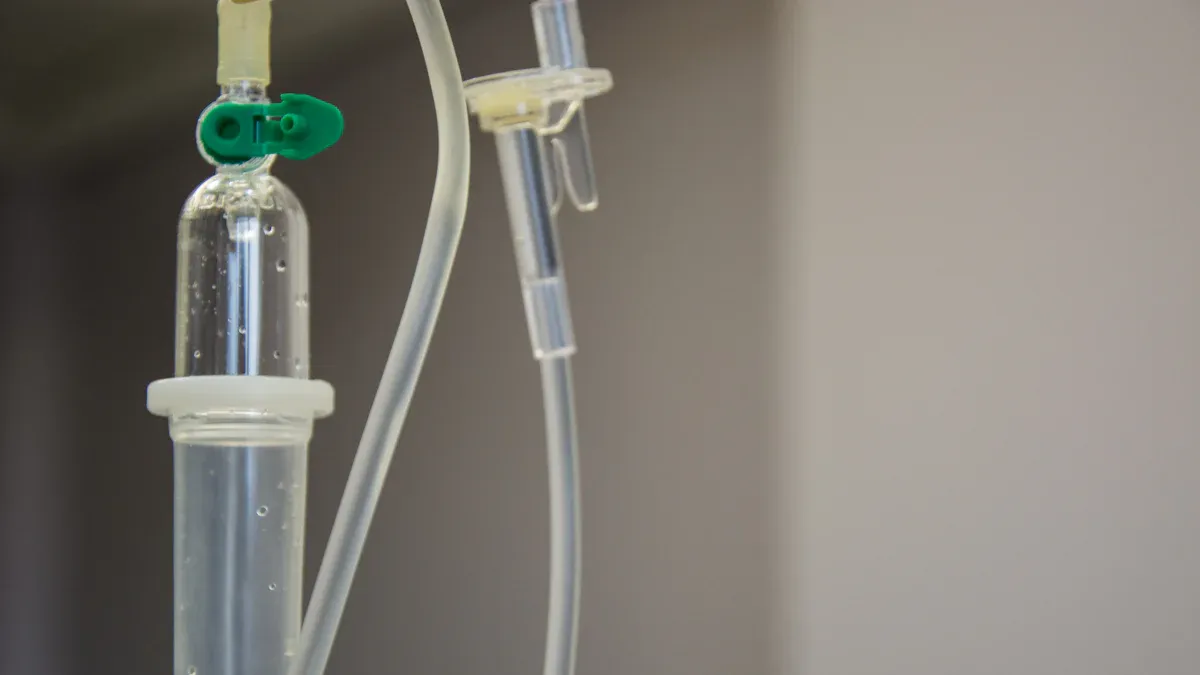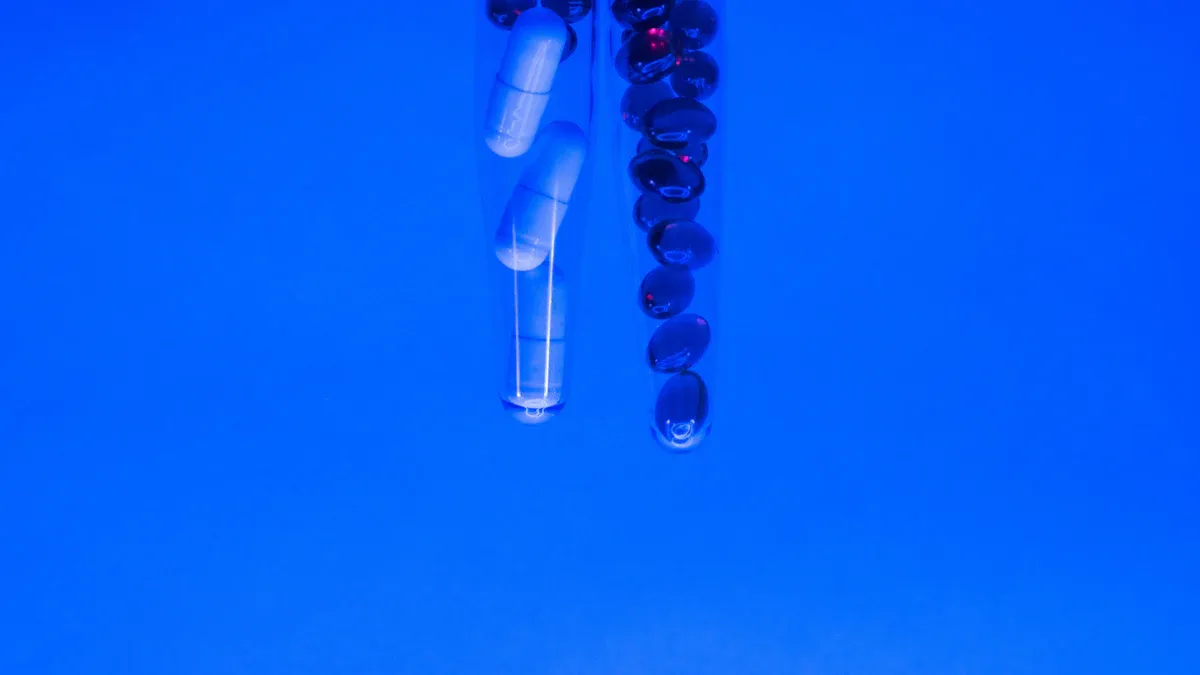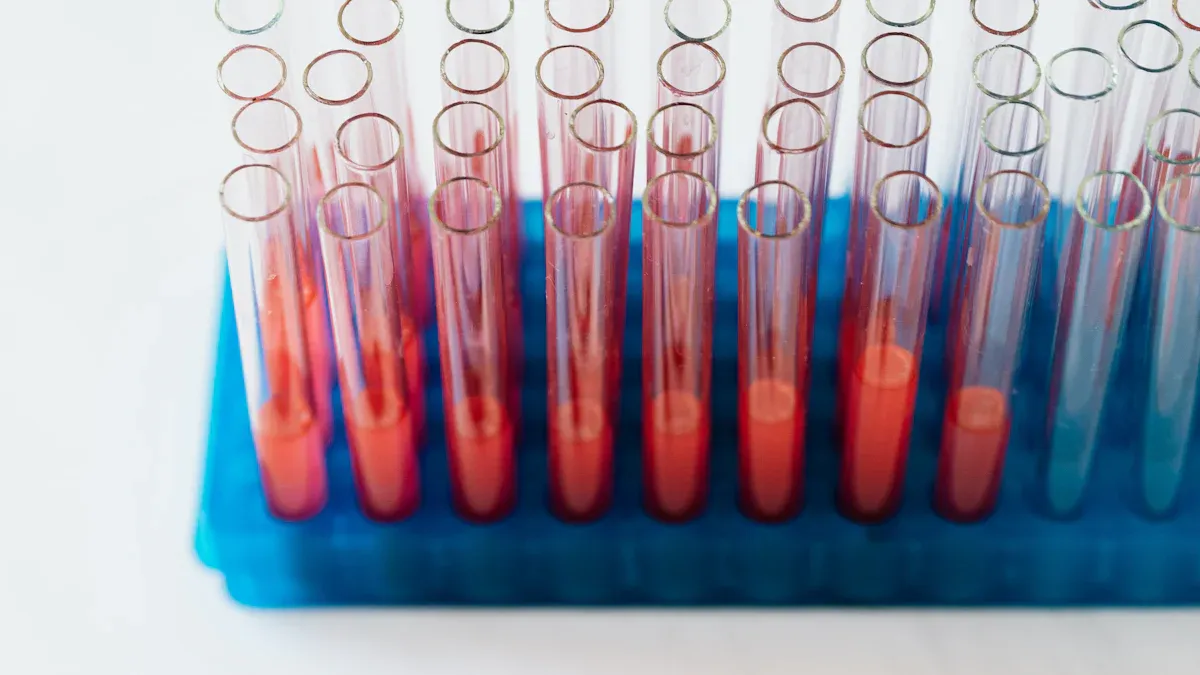Exploring the Best Nitinol Tubing for Medical Devices

Selecting the best Nitinol tubing plays a vital role in the success of medical devices. Manufacturers adhering to ISO 13485 certification ensure high safety and reliability standards, which directly impact device performance. Devices produced under such standards have demonstrated fewer defects, with 78% of certified manufacturers reporting reduced recalls. This translates into better patient outcomes by minimizing complications during treatment.
Clinical studies highlight the benefits of premium Nitinol tubing, including minimal tissue reactions post-implantation and a 30% sustained reduction in intraocular pressure over six months. High-quality tubing ensures durability and precision, critical for advancing medical innovations and improving patient care.
Key Takeaways
Picking certified makers, like ISO 13485 ones, ensures safety and trust in medical tools.
Nitinol tubing has special traits like shape memory and flexibility, making it work better in medical uses.
Custom Nitinol tubing helps meet exact needs, improving devices and helping patients.
Buying good Nitinol tubing saves money over time because it lasts long and needs less fixing.
Good customer help and steady supplies are key for fast delivery and great quality in Nitinol tubing.
Understanding Nitinol Tubing

Properties of Nitinol
Nitinol, a nickel-titanium alloy, stands out due to its unique properties that make it indispensable in medical applications. Its shape memory effect allows it to return to its original shape when exposed to heat, a feature that enhances its adaptability in dynamic environments. Additionally, nitinol exhibits superelasticity, enabling it to endure significant deformation and recover without permanent damage. This characteristic is crucial for devices that require flexibility and resilience.
The material's biocompatibility and corrosion resistance further solidify its role in the medical field. Nitinol resists wear and fatigue, ensuring durability even under repeated stress. These properties make it suitable for long-term use in the human body. The table below highlights some of its key technical attributes:
Property | Description |
|---|---|
Corrosion Resistance | Nitinol exhibits excellent resistance to corrosion, making it suitable for harsh environments. |
Fatigue Resistance | The material can withstand repeated stress without failure, enhancing its durability. |
Wear Resistance | Nitinol's ability to resist wear contributes to its longevity in applications. |
These features have positioned nitinol tubing as a cornerstone in the development of advanced medical devices.
Applications in Medical Devices
Nitinol tubing plays a pivotal role in modern medical innovations. Its unique properties have enabled the creation of devices that improve patient outcomes and procedural success rates. For instance, nitinol stents have revolutionized cardiovascular treatments. Clinical trials, such as the MISAGO 1 and ORION studies, demonstrated superior outcomes for nitinol stent implantation compared to traditional methods. These stents maintain vessel patency while offering flexibility and support.
In minimally invasive procedures, nitinol guidewires enhance precision by navigating complex vascular pathways. This capability reduces procedural risks and improves efficiency. Furthermore, nitinol tubing has transformed the design of self-expanding stents, ensuring optimal support and biocompatibility.
The nitinol tubing market continues to grow as demand for advanced medical devices rises. Its applications extend beyond stents and guidewires to include orthopedic implants, surgical instruments, and catheters. The material's biocompatibility and corrosion resistance make it ideal for these uses, ensuring safety and longevity in the human body.
Nitinol tubing's versatility and reliability have made it a cornerstone of the medical industry. Its ability to meet the rigorous demands of healthcare applications underscores its importance in advancing patient care.
Leading Nitinol Tube Manufacturers
GEE SMA: High-Quality and Reliability
GEE SMA has established itself as one of the leading players in nitinol tube manufacturing, known for its exceptional product quality and reliability. The company specializes in producing nitinol tubing with properties that meet the rigorous demands of medical applications. Its products exhibit outstanding elasticity and flexibility, allowing them to endure repeated bending and twisting without permanent deformation. This makes GEE SMA's tubing ideal for devices like stents and guidewires, where resilience is critical.
The shape memory effect of GEE SMA's nitinol tubing ensures that it can return to its original form after deformation, a feature particularly valuable in minimally invasive medical procedures. Additionally, the tubing demonstrates high corrosion resistance, enabling it to perform reliably in harsh environments, including the human body. Its unmatched fatigue resistance ensures long-term durability, even under repetitive stress. These qualities have made GEE SMA a trusted name among nitinol tube manufacturers.
Note: The increasing adoption of nitinol-based medical tubing for stents and guidewires highlights the growing demand for high-quality products like those offered by GEE SMA.
Dynalloy: Innovations in Nitinol Tubing
Dynalloy stands out for its commitment to innovation in nitinol tubing technology. The company has implemented automated systems to minimize human error, ensuring consistent quality across its product range. This focus on precision has made Dynalloy a preferred choice for high-strength nitinol tubing used in vascular stents and other medical devices.
Dynalloy has also developed new alloy compositions to enhance fatigue resistance and biocompatibility, addressing the specific needs of medical applications. Its environmentally friendly production practices, including closed-loop systems, reduce waste and energy consumption, aligning with modern sustainability goals. The adoption of Industry 4.0 technologies, such as IoT devices, allows Dynalloy to monitor production metrics in real time, further improving operational efficiency.
Key Strengths of Dynalloy:
Exceptional fatigue resistance for long-term performance.
Rigorous testing protocols to meet stringent industry standards.
Advanced manufacturing processes that prioritize sustainability.
These innovations have solidified Dynalloy's reputation as one of the leading players in nitinol tube manufacturing, particularly for applications requiring high precision and reliability.
Fort Wayne Metals: Advanced Manufacturing Capabilities
Fort Wayne Metals has earned its place among the top nitinol tube manufacturers through its advanced manufacturing processes and stringent quality assurance protocols. The company employs a fully integrated approach, overseeing every stage of production from melting to custom finishing. This ensures that its nitinol tubing meets the highest standards of quality and performance.
All binary nitinol grades produced by Fort Wayne Metals comply with ASTM F2063 standards, which are essential for surgical implants. The company also offers a diverse range of customizable nitinol products, catering to the unique requirements of medical device manufacturers. Its ability to deliver precision-engineered solutions has made it a trusted partner in the medical industry.
Notable Features of Fort Wayne Metals:
Compliance with ASTM F2063 standards for surgical implants.
Fully integrated production processes for consistent quality.
Customizable nitinol tubing solutions for specialized applications.
Fort Wayne Metals' dedication to quality and innovation has positioned it as a leader in the nitinol tubing market, supporting the development of advanced medical devices.
Resonetics: Precision and Customization
Resonetics has emerged as a leader in nitinol tubing manufacturing, offering unmatched precision and customization for medical applications. The company specializes in laser micromachining, enabling the production of nitinol tubing with intricate designs and tight tolerances. This capability supports the development of advanced medical devices, including minimally invasive surgical tools and implantable components.
Resonetics prioritizes customization to meet the unique requirements of medical device manufacturers. Its engineers collaborate closely with clients to design tubing that aligns with specific performance criteria. This approach ensures that the tubing exhibits optimal flexibility, durability, and biocompatibility. Resonetics also offers a wide range of nitinol tubing sizes and wall thicknesses, catering to diverse medical applications.
The company’s investment in cutting-edge technology further enhances its precision capabilities. Resonetics employs automated systems to maintain consistency and reduce variability in production. These systems allow for the creation of tubing with exceptional dimensional accuracy, which is critical for devices that demand high reliability.
Resonetics’ commitment to quality and innovation has solidified its reputation as a trusted partner in the medical industry. Its ability to deliver customized nitinol tubing solutions supports the advancement of healthcare technologies, improving patient outcomes and procedural success rates.
Confluent Medical Technologies: Improved Lead Times
Confluent Medical Technologies has distinguished itself by achieving improved lead times for nitinol tubing production. The company’s strategic investments have streamlined its manufacturing processes, enabling faster delivery of high-quality tubing to medical device manufacturers.
A key factor in this improvement is Confluent’s acquisition of the nitinol gun drilling operations from Medical Component Specialists. This strategic move brought nitinol input tubing capabilities in-house, enhancing production efficiency and reducing reliance on external suppliers. The integration of these capabilities has strengthened Confluent’s premium nitinol tubing initiative, ensuring quicker turnaround times for clients.
Evidence Type | Description |
|---|---|
Strategic Investment | Resonetics has acquired the nitinol gun drilling operations of Medical Component Specialists. |
Improved Capabilities | This acquisition brings nitinol input tubing capabilities in-house, enhancing production efficiency. |
Lead Time Improvement | The strategic move strengthens Resonetics’ premium nitinol tubing initiative, improving lead times. |
Confluent Medical Technologies also employs advanced manufacturing techniques to optimize production workflows. These techniques include automated systems and real-time monitoring, which minimize delays and ensure consistent quality. The company’s focus on operational efficiency has positioned it as a reliable supplier of nitinol tubing for critical medical applications.
By reducing lead times, Confluent Medical Technologies supports the rapid development of medical devices, enabling manufacturers to bring innovative solutions to market more quickly. This capability plays a vital role in addressing the growing demand for nitinol tubing in healthcare, ensuring timely access to essential components for life-saving technologies.
Evaluating High-Strength Nitinol Tubing

Quality Standards and Certifications
High-strength nitinol tubing must meet stringent quality standards to ensure its reliability in medical applications. Manufacturers implement rigorous quality control measures to maintain consistency and safety. Adherence to certifications like ISO 13485 demonstrates a commitment to producing medical-grade tubing that meets international standards. This certification ensures that the tubing is manufactured under controlled conditions, minimizing risks associated with contamination or defects.
Good Manufacturing Practices (GMP) further validate the cleanliness and process controls required for medical tubing. Compliance with FDA regulations, such as FDA 21 CFR Part 820, ensures that the tubing meets quality system requirements for medical devices. Each batch undergoes extensive testing for properties like radial force, fatigue resistance, and biocompatibility. These protocols ensure that the tubing performs reliably under dynamic conditions.
Standard/Protocol | Details |
|---|---|
ISO 13485 | |
FDA 21 CFR Part 820 | Regulations governing quality system requirements for medical devices. |
Testing Protocols | Each batch undergoes testing for radial force, fatigue resistance, and biocompatibility. |
Average Failure Rates | 12–15% during trials, indicating the need for rework cycles. |
Compliance Cost Increase | A leading European manufacturer reported a 22% increase in compliance costs due to enhanced sterilization protocols. |
These certifications and standards ensure that high-strength nitinol tubing meets the rigorous demands of medical applications, providing reliability and safety for patients.
Customization Options for Medical Applications
Customization plays a pivotal role in the effectiveness of high-strength nitinol tubing for diverse medical applications. Manufacturers collaborate with clients to design tubing that meets specific requirements, ensuring optimal performance and reliability. This flexibility allows for addressing unique application demands, such as varying diameters, wall thicknesses, and surface finishes.
Property | Description | Application Area |
|---|---|---|
Superelasticity | Allows nitinol to expand and contract, adapting to the body's environment. | Vascular applications |
Shape memory | Maintains structural integrity under varying conditions. | Stents and medical devices |
Customization | Tailored solutions for specific requirements enhance performance. | Various medical applications |
Suppliers like EUROFLEX and Confluent Medical Technologies offer tailored solutions to meet the unique needs of medical device manufacturers. For example, nitinol tubing used in stents requires both strength and flexibility to maintain vessel patency. Customization ensures that the tubing exhibits these properties while maintaining biocompatibility.
Functionalized nitinol has also shown effectiveness in advanced applications like drug delivery systems and mechanical circulatory support devices. These tailored solutions highlight the versatility of nitinol tubing in addressing complex medical challenges.
Pricing and Cost Efficiency
The cost efficiency of high-strength nitinol tubing makes it a preferred choice for medical applications despite its higher initial cost. Nitinol's exceptional durability reduces maintenance requirements, leading to lower total ownership costs over time. Its resistance to corrosion minimizes the need for frequent replacements, further enhancing its cost-effectiveness.
Aspect | Nitinol Tubing Benefits | Traditional Materials (e.g., Steel) |
|---|---|---|
Initial Cost | Higher initial acquisition cost | Lower initial cost |
Durability | Exceptional durability leading to reduced maintenance requirements | Requires regular maintenance and inspections |
Maintenance Costs | Significantly lower due to reduced frequency of replacements | Higher due to frequent replacements and maintenance |
Operational Life | Extensions of 300-500% in dynamic applications | Frequent replacements due to work hardening and fatigue |
Total Ownership Costs | Lower total costs over time due to reduced downtime and maintenance | Higher total costs due to frequent replacements and downtime |
Customization | Tailored properties for specific applications | Limited customization options |
Nitinol tubing's extended lifespan significantly reduces downtime expenses in complex installations. For example, in vascular applications, its ability to withstand dynamic conditions ensures long-term reliability, minimizing operational disruptions. While the initial investment may be higher, the long-term savings make high-strength nitinol tubing a cost-effective solution for medical device manufacturers.
Customer Support and Supply Chain Reliability
Customer support and supply chain reliability play a crucial role in the success of nitinol tubing manufacturers. These factors directly impact the ability of medical device companies to deliver high-quality products on time. Reliable supply chains ensure consistent access to tubing materials, while robust customer support helps resolve issues quickly and efficiently.
Importance of Customer Support in Nitinol Tubing Manufacturing
Manufacturers of nitinol tubing must prioritize customer support to maintain strong relationships with medical device companies. Effective communication channels allow manufacturers to address client concerns, provide technical assistance, and offer guidance on product specifications. For example, when a medical company requires tubing with specific dimensions or surface finishes, responsive customer support ensures that these needs are met promptly.
Tip: Manufacturers that invest in dedicated support teams often experience higher customer satisfaction rates, which can lead to long-term partnerships.
Customer support also plays a vital role in troubleshooting. If a batch of tubing fails to meet quality standards, manufacturers must act swiftly to identify the issue and provide solutions. This proactive approach minimizes delays in production and ensures that medical devices maintain their high standards of quality.
Ensuring Supply Chain Reliability for Nitinol Tubing
A reliable supply chain is essential for the consistent production of nitinol tubing. Manufacturers must establish strong relationships with suppliers to secure high-quality raw materials. These partnerships reduce the risk of disruptions, ensuring that medical companies receive tubing on time.
Key strategies for enhancing supply chain reliability include:
Diversification of Suppliers: Relying on multiple suppliers reduces the risk of shortages and ensures a steady flow of materials.
Real-Time Monitoring: Using advanced technologies like IoT devices allows manufacturers to track inventory levels and anticipate potential delays.
Strategic Warehousing: Maintaining adequate stock levels in regional warehouses ensures faster delivery to medical companies.
Strategy | Benefit |
|---|---|
Diversification of Suppliers | Reduces dependency on a single source, minimizing risks of shortages. |
Real-Time Monitoring | Provides early warnings of potential disruptions, enabling quick action. |
Strategic Warehousing | Ensures timely delivery to clients, improving operational efficiency. |
Balancing Customer Support and Supply Chain Efficiency
Manufacturers must strike a balance between customer support and supply chain efficiency to meet the demands of the medical industry. For instance, while addressing client-specific requests, manufacturers must also ensure that these customizations do not disrupt production schedules. Clear communication and streamlined processes help achieve this balance.
Note: Companies that excel in both customer support and supply chain reliability often gain a competitive edge in the nitinol tubing market.
By prioritizing these aspects, manufacturers can build trust with medical device companies, ensuring long-term success and the delivery of high-quality tubing for critical applications.
Comparing Nitinol Tubing Products
Material Composition and Durability
Nitinol tubing stands out due to its unique material composition and durability, making it indispensable for medical applications. Manufacturers analyze chemical composition, transformation temperatures, and microstructural attributes to ensure optimal performance. Fatigue testing highlights differences in material grades, with standard VIM-VAR nitinol compared to high-cycle fatigue (HCF) grades. These cleaner grades exhibit superior fatigue resistance, ensuring long-term reliability in dynamic environments.
Key Material Insights:
Chemical composition determines corrosion resistance and biocompatibility.
Transformation temperatures influence shape memory and superelastic properties.
Microstructural attributes affect fatigue life and wear resistance.
Durability testing underscores the importance of selecting high-quality nitinol tubing for medical devices. Tubing made from HCF materials demonstrates enhanced performance under repeated stress, reducing the risk of failure during critical procedures. This durability ensures that medical devices maintain their functionality over extended periods, improving patient outcomes.
Dimensional Accuracy and Tolerances
Dimensional accuracy plays a crucial role in the effectiveness of nitinol tubing for medical applications. Manufacturers implement advanced techniques to meet precise requirements, particularly for neurovascular stents. Strict adherence to tolerances minimizes complications during deployment, enhancing procedural success rates.
Measurement Type | Specification |
|---|---|
Outer Diameter | |
Wall Thickness | Ranges from 0.1mm to 15mm |
Length | Up to 6000mm |
Tolerance Control | Consistent delivery with tight tolerances |
Dimensional precision ensures that nitinol tubing meets the rigorous demands of medical applications. Evaluation of tolerances occurs at multiple points along the tubing, guaranteeing consistency. For neurovascular stents, even minor deviations can impact performance, making precision critical.
Manufacturers prioritize quality control to maintain tight tolerances. This approach reduces variability, ensuring that tubing performs reliably in complex medical environments. By achieving dimensional accuracy, manufacturers support the development of advanced medical devices that improve patient care.
Delivery Times and Supply Chain Efficiency
Efficient delivery times and reliable supply chains are essential for meeting the growing demand for nitinol tubing in the medical industry. Manufacturers employ strategic warehousing and real-time monitoring to ensure timely delivery. Diversification of suppliers reduces dependency on single sources, minimizing risks of shortages.
Strategies for Supply Chain Efficiency:
Real-time monitoring tracks inventory levels and anticipates delays.
Strategic warehousing ensures faster delivery to regional clients.
Supplier diversification reduces risks associated with material shortages.
Reliable supply chains enable manufacturers to meet production schedules without compromising quality. For example, timely delivery of nitinol tubing supports the rapid development of stents and other medical devices. Manufacturers that excel in supply chain management gain a competitive edge, ensuring consistent access to high-quality tubing for critical applications.
Tip: Companies that invest in supply chain optimization and customer support often experience higher client satisfaction, fostering long-term partnerships.
Selecting the right supplier for Nitinol tubing is critical for ensuring the success of medical devices. Manufacturers that prioritize quality control and precision, such as those certified under ISO 13485, deliver consistent performance and safety. For example, Fort Wayne Metals demonstrates the importance of rigorous quality processes, which are essential for meeting industry standards and customer satisfaction.
Evaluating suppliers based on customization options and reliability further enhances the effectiveness of medical devices. Many manufacturers offer tailored solutions, including laser-cut components and various surface finishes, to meet specific application needs. These features ensure that tubing performs optimally in demanding environments.
Informed decision-making is vital in this process. Poor management of materials data can lead to design flaws, increased costs, and potential product recalls. By carefully assessing suppliers, medical companies can mitigate risks and achieve better outcomes for patients.
Tip: Benchmarking metrics, such as tensile strength (500 MPa to 900 MPa) and cycles to failure (up to 10⁷ cycles), provide valuable insights into the reliability of Nitinol tubing suppliers.
FAQ
What is Nitinol tubing used for in medical devices?
Nitinol tubing is used in stents, guidewires, catheters, and orthopedic implants. Its shape memory and superelastic properties make it ideal for minimally invasive procedures and long-term applications in the human body.
How does Nitinol's shape memory effect benefit medical devices?
The shape memory effect allows Nitinol tubing to return to its original form after deformation. This feature enhances adaptability in dynamic environments, making it suitable for devices like self-expanding stents.
Are there certifications required for Nitinol tubing manufacturers?
Yes, manufacturers must comply with ISO 13485 and FDA regulations like 21 CFR Part 820. These certifications ensure the tubing meets stringent quality standards for medical applications.
Can Nitinol tubing be customized for specific medical applications?
Manufacturers offer customization options, including varying diameters, wall thicknesses, and surface finishes. These tailored solutions ensure optimal performance for specific medical devices, such as vascular stents or surgical instruments.
Why is Nitinol tubing considered cost-efficient despite its higher price?
Nitinol tubing's durability and corrosion resistance reduce maintenance and replacement costs. Its long operational life lowers total ownership expenses, making it a cost-effective choice for medical device manufacturers.
See Also
Understanding Nitinol Tubing Uses in Medical Equipment
The Manufacturing Process of Nitinol Tubing for Healthcare
Nitinol Tubing's Impact on the Future of Medical Devices
The Importance of Nitinol Tubing in Modern Healthcare
Nitinol Tubing's Contribution to Innovations in Medical Technology

